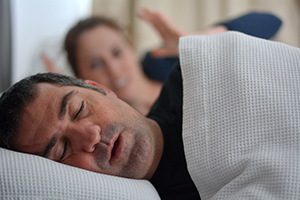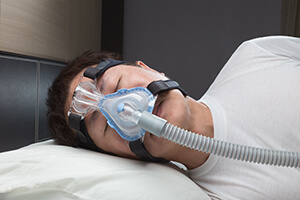Obstructive sleep apnea (OSA) is a medical condition that affects millions of people around the world. If you don’t treat it, the effects can be serious. Untreated sleep apnea can cause more than just a bad night’s sleep—it can also increase your risk of high blood pressure, pulmonary hypertension, heart disease, stroke, diabetes, metabolic syndrome, and sudden death.
What is Obstructive Sleep Apnea?

Obstructive sleep apnea happens when the muscles and soft tissues in the back of the throat relax, causing a full or partial collapse of the upper airway, which prevents air from getting into the lungs. This reduces oxygen in the blood, causes prolonged pauses in breathing, and leads to excessive awakenings at night. It can also make you snore loudly and choke or gasp.
People with OSA and other sleep disorders may be unaware that they have these symptoms because they are asleep when their breathing stops or becomes shallow. People who live with them, however, are oftentimes well aware of the problem. They definitely notice that their loved one takes long breaks between breaths. Other signs may include excessive daytime sleepiness, snoring, headaches in the morning, dry mouth when waking up, and trouble concentrating or poor memory.
Most of the time, doctors use polysomnography (PSG) to diagnose sleep apnea. This test takes place over the course of one night. It checks your brain activity, vital signs, and oxygen levels while you sleep. This information is collected and analyzed by your sleep specialist, who then determines how bad your sleep apnea is and how many times you stop breathing during the night. In certain situations, the American Academy of Sleep Medicine says that a home sleep study can be done instead of a PSG, based on specific clinical criteria.
What Treatments Are Available for Obstructive Sleep Apnea?

- Continuous positive airway pressure (CPAP) is one of the most common ways to treat OSA and is considered the gold standard. Positive pressure keeps your airway open while you sleep, letting more oxygen into your lungs, decreasing snoring, and diminishing daytime OSA symptoms. The device is made up of a mask that goes over your nose or mouth, a tube that connects to an air compressor, and straps that keep in place while you sleep.
- A mandibular advancement device (MAD) can be made for you by your dentist. If you live in or near Little Rock, Dr. Randy Machen and his colleagues at Little Rock Family Dental Care can assist with fitting you for a MAD. With a MAD, your lower jaw is moved forward while you sleep. This keeps your airway open by preventing the soft tissue from obstructing it, making it easier to breathe at night and mitigating daytime symptoms. A MAD can be easy to use and comfortable, but your body will need time to get used to it before it can be effective.
CPAP, MADs, and other changes to your lifestyle can help with the symptoms of OSA. But bariatric surgery may be able to help people who are obese and have OSA as well.
How Does Bariatric Surgery Impact Sleep Apnea?
There is a very strong link between being overweight and having obstructive sleep apnea. In fact, the relationship between severe obesity patients and OSA is almost linear. The risk of OSA goes up as the body mass index (BMI) goes up. On the other hand, people with OSA will have fewer symptoms if they lose weight.
This strong link is caused by the changes in the body that happens when people gain weight. When a person is overweight, they store more fat in their neck and throat, which can block their airway while they sleep. OSA patients often snore because fatty tissue in their throats blocks their airways and causes upper airway collapse. They are also very sleepy during the day because they don’t get enough sleep at night.
As many as 80% of obese people who want weight loss surgery have OSA. Bariatric surgery is a procedure that causes weight loss by changing the gastrointestinal (GI) tract. As a result, the body absorbs fewer calories from food and the GI hormones normalize. Weight loss helps patients lose extra body fat, which opens the airway and lets more oxygen into the blood during sleep. In addition, patients experience the resolution of other medical problems and improved quality of life as a result of bariatric surgery.
The research backs up the fact that patients who have bariatric surgery can get rid of their OSA completely or partially. For example, the Swiss Multicenter Bypass or Sleeve Study (SM-BOSS) is a prospective, randomized trial with 217 patients. They either had a laparoscopic sleeve gastrectomy (LSG) or a laparoscopic gastric bypass (LRYGB), and the results were tracked for 5 years. At 3 years, both groups had lost more than 70% of their extra body weight, and 100% of patients said that their OSA had improved or resolved. After 5 years, over 95% of patients still said that their OSA was improved or resolved.
The SM-BOSS study isn’t the only study saying this. Another systematic review from 2013 looked at 69 studies with almost 14,000 people. The authors wrote that “over 75% of patients with sleep apnea saw at least some improvement.”
What Types of Bariatric Surgery Could Be Considered for Treating Sleep Apnea?
Bariatric surgery can profoundly affect obstructive sleep apnea and its resulting symptoms. Even though there are other types of bariatric procedures, laparoscopic Roux-en-Y gastric bypass (RYGB) and laparoscopic sleeve gastrectomy (LSG) are the most common ones to treat OSA and are among the most effective ones today.
Laparoscopic Roux-en-Y Gastric Bypass (RYGB)
Gastric bypass surgery is considered the gold standard for treating obesity-related comorbidities like OSA because it can lead to long-term weight loss while also improving metabolic health markers like sleep apnea, high blood pressure, diabetes, insulin resistance, and other metabolic disorders.
In this procedure, part of the intestine is rerouted to a small pouch that is made at the top of the stomach to limit the amount of food that can be eaten. This causes the person to eat less and absorb less of the calories they eat than normal digestion would allow. It also changes the hormones in the gut, which makes the body use and divide the calories normally.
Laparoscopic Sleeve Gastrectomy (LSG)
Sleeve gastrectomy is another common type of bariatric surgery that is used on people who are very obese and have severe OSA. During this procedure, 70% to 80% of the stomach’s volume is removed. This causes people to eat smaller portions at each meal, and the GI hormones allow the calories to be broken down and used normally.
When combined with dietary changes and exercise plans, LSG can help people lose weight quickly. This makes it a good choice for many people who need to lose weight but are afraid of the aggressiveness of the RYGB.
If a person with obstructive sleep apnea decides to have bariatric surgery, some or even all of their clinical symptoms may go away. In fact, it can make your symptoms go away to the point where you no longer need CPAP therapy. When OSA is fixed, the health of the patient is changed for the better, and their quality of life is improved.
Talk to a Bariatric Surgeon About Surgery for Obstructive Sleep Apnea
If you’re considering bariatric surgery to treat your obstructive sleep apnea, it’s important to connect to one of the top bariatric surgeons in Arkansas. Dr. Samuel Bledsoe is the Medical Director of Arkansas Heart Hospital’s Bariatric & Metabolic Institute. He and his expert partners look forward to assisting you in your weight loss journey. Call them at (501) 219-7770 to get in touch. They would love to help you on your way to experiencing better health and an improved quality of life. Don’t trust your health to surgeons or programs that aren’t as experienced.
